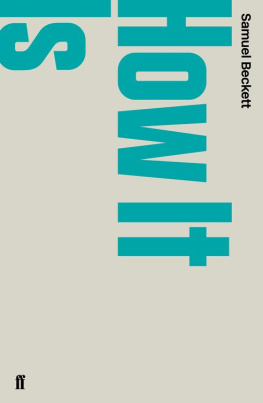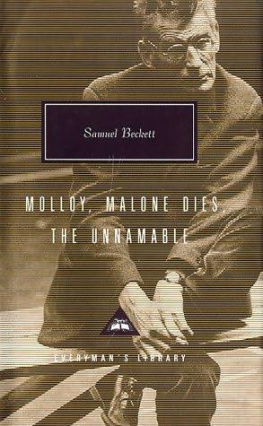Beckett Samuel - Samuel Beckett and the Politics of Aftermath
Here you can read online Beckett Samuel - Samuel Beckett and the Politics of Aftermath full text of the book (entire story) in english for free. Download pdf and epub, get meaning, cover and reviews about this ebook. City: Europe;Ireland, year: 2018, publisher: Oxford University Press, genre: Politics. Description of the work, (preface) as well as reviews are available. Best literature library LitArk.com created for fans of good reading and offers a wide selection of genres:
Romance novel
Science fiction
Adventure
Detective
Science
History
Home and family
Prose
Art
Politics
Computer
Non-fiction
Religion
Business
Children
Humor
Choose a favorite category and find really read worthwhile books. Enjoy immersion in the world of imagination, feel the emotions of the characters or learn something new for yourself, make an fascinating discovery.
- Book:Samuel Beckett and the Politics of Aftermath
- Author:
- Publisher:Oxford University Press
- Genre:
- Year:2018
- City:Europe;Ireland
- Rating:5 / 5
- Favourites:Add to favourites
- Your mark:
- 100
- 1
- 2
- 3
- 4
- 5
Samuel Beckett and the Politics of Aftermath: summary, description and annotation
We offer to read an annotation, description, summary or preface (depends on what the author of the book "Samuel Beckett and the Politics of Aftermath" wrote himself). If you haven't found the necessary information about the book — write in the comments, we will try to find it.
Samuel Beckett and the Politics of Aftermath — read online for free the complete book (whole text) full work
Below is the text of the book, divided by pages. System saving the place of the last page read, allows you to conveniently read the book "Samuel Beckett and the Politics of Aftermath" online for free, without having to search again every time where you left off. Put a bookmark, and you can go to the page where you finished reading at any time.
Font size:
Interval:
Bookmark:


Great Clarendon Street, Oxford, ox2 6dp, United Kingdom
Oxford University Press is a department of the University of Oxford. It furthers the Universitys objective of excellence in research, scholarship, and education by publishing worldwide. Oxford is a registered trade mark of Oxford University Press in the UK and in certain other countries
James McNaughton 2018
The moral rights of the author have been asserted
First Edition published in 2018
Impression: 1
All rights reserved. No part of this publication may be reproduced, stored in a retrieval system, or transmitted, in any form or by any means, without the prior permission in writing of Oxford University Press, or as expressly permitted by law, by licence or under terms agreed with the appropriate reprographics rights organization. Enquiries concerning reproduction outside the scope of the above should be sent to the Rights Department, Oxford University Press, at the address above
You must not circulate this work in any other form and you must impose this same condition on any acquirerPublished in the United States of America by Oxford University Press198 Madison Avenue, New York, NY 10016, United States of America
British Library Cataloguing in Publication Data
Data available
Library of Congress Control Number: 2017964272
ISBN 9780198822547
ebook ISBN 9780192555502
Printed and bound byCPI Group (UK) Ltd, Croydon, CR0 4YY
Links to third party websites are provided by Oxford in good faith andfor information only. Oxford disclaims any responsibility for the materialscontained in any third party website referenced in this work.
For Mary and for Niamh
The music is a glass-house on the slope
where the stones fly, the stones roll.
And the stones roll right through
but each pane stays whole.
from Allegro by Tomas Transtrmer
Many people encouraged me in writing this book during its long genesis and completion. Im most grateful to Adam Parkes, who has offered warm friendship and astute, light-handed professional advice at decisive moments of application: to graduate school, to assistant professor jobs, for tenure, and in applying myself to this book and this book to a publisher. Sen Kennedy has generously encouraged my work over the last decade and published it in collections he deftly edited. Both he and Adam have joined other friends and colleagues who have read individual chapters: Neil Doshi, Alex Cook, Duncan Yoon, and David Deutsch. I appreciate Bill Ulmers steady encouragement and practical guidance. Im grateful to my other English department colleagues, to my former chair Catherine Davies, and current department chair Joel Brouwer.
Thanks to Edward Beckett for attending to my work and to the Beckett Estate for permission to quote from Becketts Notes on Philosophy, German Diaries, German Vocabulary Notebooks, letters, and other unpublished drafts and versions of Becketts work. Thanks to Bloodaxe Books for permission to quote from Tomas Transtrmer, New Collected Poems, trans. Robin Fulton (Hexham: Bloodaxe Books, 2011). was previously published in Sen Kennedy and Katherine Weiss (eds.), Samuel Beckett: History, Memory, Archive (New York: Palgrave Macmillan, 2009), reproduced with permission of Palgrave Macmillan.
The archival research was facilitated by librarians at Trinity College Dublin, the Reading Foundation, and the Harry Ransom Center, and Im grateful to all of them, especially Elizabeth Garver in Austin. My colleague from the History department, Margaret Peacock, counseled me on histories of Ukraine. At Oxford University Press, Jacqueline Norton and Aimee Wright have been terrific to work with, and the two anonymous readers of the manuscript suggested sharp improvements and expressed appreciation that lifted me to the end. Without the support of the University of Alabamasabbatical leave, two University of Alabama Research Grants, and unfailing interlibrary loan and library services (looking at you, Brock Tyra)I would not have completed this book. The Beckett community is collegial and supportive. Thanks to David Lloyd and Andrew Gibson for encouraging me with this project; thanks to Mark Nixon for confirming my transcription of certain patches in Becketts piebald handwriting; and thanks to other Beckett scholars for illuminating the path: Patrick Bixby, Jos Francisco Fernndez, Jim Knowlson, Nadia Louar, Emilie Morin, John Pilling, Mark Quigley, and David Suchoff, among others. I have presented this work at Beckett conferences as well as conferences for the Modernist Studies Association, the International Association for the Study of Irish Literatures, and the American Comparative Literature Association. For all the tips, leads, and suggestions from other participants, my thanks.
Thanks to Nicholas Allen at the Wilson Center for the Humanities and Arts, and to Susan Rosenbaum, Adam Parkes, and the other engaging members of the Interdisciplinary Modernist Group at the University of Georgia for inviting me to Athens to present . I spent writing time in the Boston Public Library and, thanks to Carol Morini, at the Boston Athenaeum. My archival work on Becketts manuscripts began long ago in graduate school: thanks to the financial support from the Rackham Graduate School at the University of Michigan. Though the work here is different from my work then, the intuitions that guide this project also emerged and were cultivated at Michigan. Enoch Brater directed my dissertation, and I found myself lucky to be taught by David Porter, Martha Vicinus, Simon Gikandi, and John Whittier-Ferguson: master teachers, among many there, who modeled a life of expansive intellectual inquiry while cultivating careful reading, historical precision, and fine attention to the sentence. I owe thanks to the students who took my Beckett courses, and in particular to the first-year research assistants assigned hours with me, Wyatt McMurray and David Kumler especially. Ill miss my father lightly asking about the mystery of this books progress, now that its out. I dedicate this book to Mary and to Niamh: they nourish every day together with unstinting vitality and love.
In a letter to Barbara Bray, Beckett comments on the name Naughton: (wonderful name for a character, why did I never think of it). We can guess the appeal: the name bounds nothing and something, like the skin of a bubble. In this spirit, my final gratitude to all those friends and colleagues I have not mentioned here by name, all those who heard naught on and not on and graciously replied aught to.
Buy Fhrer, The one Fhrer, academic guide and aesthetic aide; the other, interminable and censorious, profoundly threatening to everything to which Beckett devotes himself. These Fhrer will jar. Eventually, Beckett finds it hard to find a decent guidebook or German history without Nazi influence:
No guide but Woerl, which they press upon me in vain. At last grudgingly produce a work by Prof. Knapp. It seems more like it. And when I hear that the book is reduced from 3.502 RM [Reichsmark], + that the author is in retirement I know I am on the right thing.
In Germany, politics cannot be kept at bay, and Beckett records one Fhrer eclipsing and literally retiring the other.
Fhrer and Fhrer is a conspicuous opening to a book that aims to illustrate how Becketts early and middle writing systematically builds out from the ironic consummation of aesthetics and politics. The spark in this example is not just a witty juxtaposition, not me striking hard aesthetic flint against harder political steel. Becketts diaries, notebooks, and letters make a point of firing off single-barreled puns, words which explode forward with personal or aesthetic meanings in propulsive proportion to their recoil against contemporary political history. Minor examples are telling: Beckett abbreviates a favorite restaurant [
Font size:
Interval:
Bookmark:
Similar books «Samuel Beckett and the Politics of Aftermath»
Look at similar books to Samuel Beckett and the Politics of Aftermath. We have selected literature similar in name and meaning in the hope of providing readers with more options to find new, interesting, not yet read works.
Discussion, reviews of the book Samuel Beckett and the Politics of Aftermath and just readers' own opinions. Leave your comments, write what you think about the work, its meaning or the main characters. Specify what exactly you liked and what you didn't like, and why you think so.

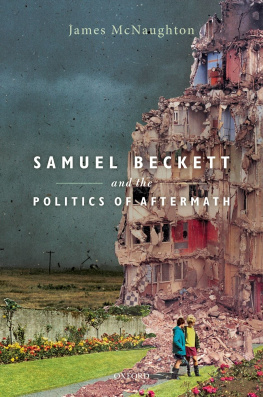
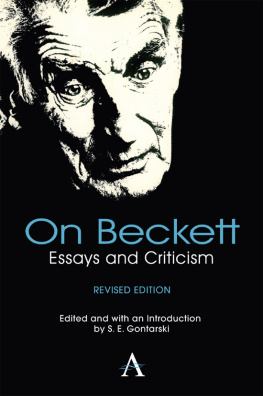
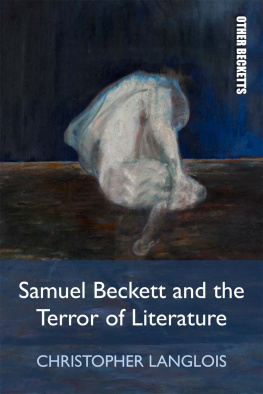
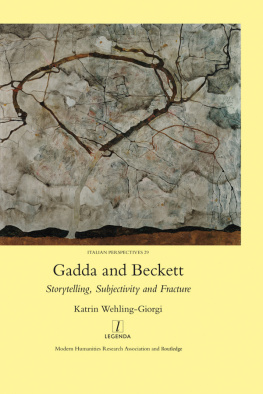
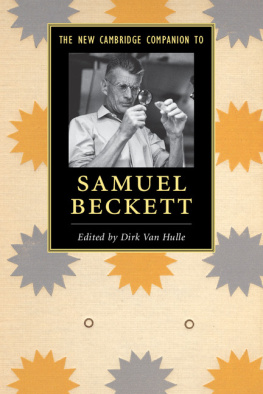
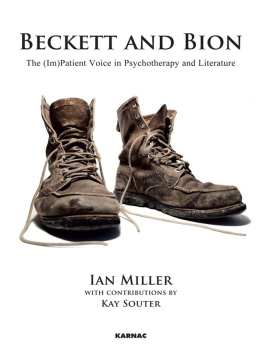
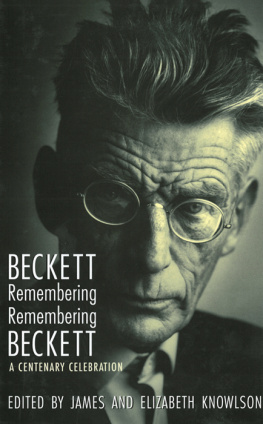

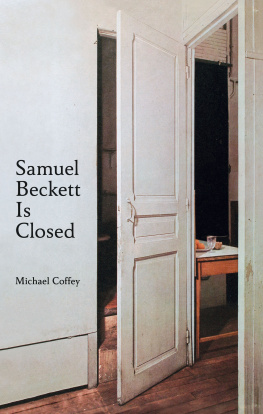
![Samuel Beckett [Samuel Beckett] - The Complete Dramatic Works](/uploads/posts/book/72751/thumbs/samuel-beckett-samuel-beckett-the-complete.jpg)
